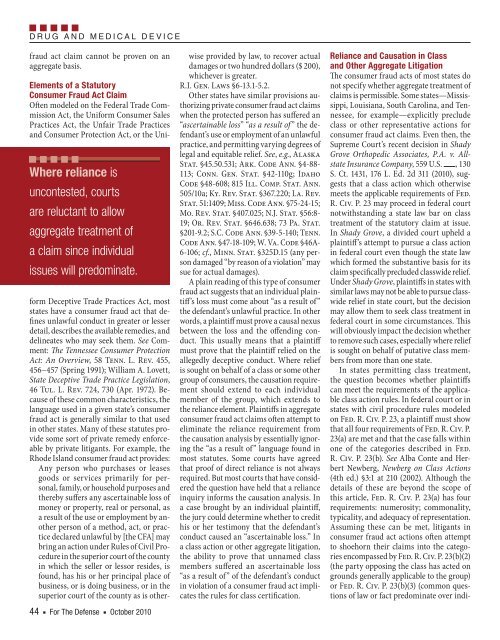For The Defense, October 2010 - DRI Today
For The Defense, October 2010 - DRI Today
For The Defense, October 2010 - DRI Today
You also want an ePaper? Increase the reach of your titles
YUMPU automatically turns print PDFs into web optimized ePapers that Google loves.
D R U G A N D M E D I C A L D E V I C Efraud act claim cannot be proven on anaggregate basis.Where reliance isuncontested, courtsare reluctant to allowaggregate treatment ofa claim since individualissues will predominate.44 n <strong>For</strong> <strong>The</strong> <strong>Defense</strong> n <strong>October</strong> <strong>2010</strong>Elements of a StatutoryConsumer Fraud Act ClaimOften modeled on the Federal Trade CommissionAct, the Uniform Consumer SalesPractices Act, the Unfair Trade Practicesand Consumer Protection Act, or the UniformDeceptive Trade Practices Act, moststates have a consumer fraud act that definesunlawful conduct in greater or lesserdetail, describes the available remedies, anddelineates who may seek them. See Comment:<strong>The</strong> Tennessee Consumer ProtectionAct: An Overview, 58 Tenn. L. Rev. 455,456–457 (Spring 1991); William A. Lovett,State Deceptive Trade Practice Legislation,46 Tul. L. Rev. 724, 730 (Apr. 1972). Becauseof these common characteristics, thelanguage used in a given state’s consumerfraud act is generally similar to that usedin other states. Many of these statutes providesome sort of private remedy enforceableby private litigants. <strong>For</strong> example, theRhode Island consumer fraud act provides:Any person who purchases or leasesgoods or services primarily for personal,family, or household purposes andthereby suffers any ascertainable loss ofmoney or property, real or personal, asa result of the use or employment by anotherperson of a method, act, or practicedeclared unlawful by [the CFA] maybring an action under Rules of Civil Procedurein the superior court of the countyin which the seller or lessor resides, isfound, has his or her principal place ofbusiness, or is doing business, or in thesuperior court of the county as is otherwiseprovided by law, to recover actualdamages or two hundred dollars ($ 200),whichever is greater.R.I. Gen. Laws §6-13.1-5.2.Other states have similar provisions authorizingprivate consumer fraud act claimswhen the protected person has suffered an“ascertainable loss” “as a result of ” the defendant’suse or employment of an unlawfulpractice, and permitting varying degrees oflegal and equitable relief. See, e.g., AlaskaStat. §45.50.531; Ark. Code Ann. §4-88-113; Conn. Gen. Stat. §42-110g; IdahoCode §48-608; 815 Ill. Comp. Stat. Ann.505/10a; Ky. Rev. Stat. §367.220; La. Rev.Stat. 51:1409; Miss. Code Ann. §75-24-15;Mo. Rev. Stat. §407.025; N.J. Stat. §56:8-19; Or. Rev. Stat. §646.638; 73 Pa. Stat.§201-9.2; S.C. Code Ann. §39-5-140; Tenn.Code Ann. §47-18-109; W. Va. Code §46A-6-106; cf., Minn. Stat. §325D.15 (any persondamaged “by reason of a violation” maysue for actual damages).A plain reading of this type of consumerfraud act suggests that an individual plaintiff’sloss must come about “as a result of”the defendant’s unlawful practice. In otherwords, a plaintiff must prove a causal nexusbetween the loss and the offending conduct.This usually means that a plaintiffmust prove that the plaintiff relied on theallegedly deceptive conduct. Where reliefis sought on behalf of a class or some othergroup of consumers, the causation requirementshould extend to each individualmember of the group, which extends tothe reliance element. Plaintiffs in aggregateconsumer fraud act claims often attempt toeliminate the reliance requirement fromthe causation analysis by essentially ignoringthe “as a result of” language found inmost statutes. Some courts have agreedthat proof of direct reliance is not alwaysrequired. But most courts that have consideredthe question have held that a relianceinquiry informs the causation analysis. Ina case brought by an individual plaintiff,the jury could determine whether to credithis or her testimony that the defendant’sconduct caused an “ascertainable loss.” Ina class action or other aggregate litigation,the ability to prove that unnamed classmembers suffered an ascertainable loss“as a result of” of the defendant’s conductin violation of a consumer fraud act implicatesthe rules for class certification.Reliance and Causation in Classand Other Aggregate Litigation<strong>The</strong> consumer fraud acts of most states donot specify whether aggregate treatment ofclaims is permissible. Some states—Mississippi,Louisiana, South Carolina, and Tennessee,for example—explicitly precludeclass or other representative actions forconsumer fraud act claims. Even then, theSupreme Court’s recent decision in ShadyGrove Orthopedic Associates, P.A. v. AllstateInsurance Company, 559 U.S. , 130S. Ct. 1431, 176 L. Ed. 2d 311 (<strong>2010</strong>), suggeststhat a class action which otherwisemeets the applicable requirements of Fed.R. Civ. P. 23 may proceed in federal courtnotwithstanding a state law bar on classtreatment of the statutory claim at issue.In Shady Grove, a divided court upheld aplaintiff’s attempt to pursue a class actionin federal court even though the state lawwhich formed the substantive basis for itsclaim specifically precluded classwide relief.Under Shady Grove, plaintiffs in states withsimilar laws may not be able to pursue classwiderelief in state court, but the decisionmay allow them to seek class treatment infederal court in some circumstances. Thiswill obviously impact the decision whetherto remove such cases, especially where reliefis sought on behalf of putative class membersfrom more than one state.In states permitting class treatment,the question becomes whether plaintiffscan meet the requirements of the applicableclass action rules. In federal court or instates with civil procedure rules modeledon Fed. R. Civ. P. 23, a plaintiff must showthat all four requirements of Fed. R. Civ. P.23(a) are met and that the case falls withinone of the categories described in Fed.R. Civ. P. 23(b). See Alba Conte and HerbertNewberg, Newberg on Class Actions(4th ed.) §3:1 at 210 (2002). Although thedetails of these are beyond the scope ofthis article, Fed. R. Civ. P. 23(a) has fourrequirements: numerosity; commonality,typicality, and adequacy of representation.Assuming these can be met, litigants inconsumer fraud act actions often attemptto shoehorn their claims into the categoriesencompassed by Fed. R. Civ. P. 23(b)(2)(the party opposing the class has acted ongrounds generally applicable to the group)or Fed. R. Civ. P. 23(b)(3) (common questionsof law or fact predominate over indi-
















